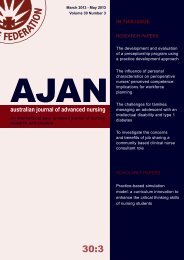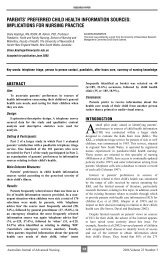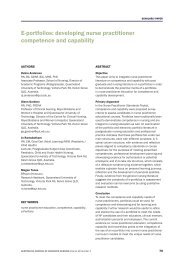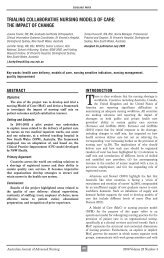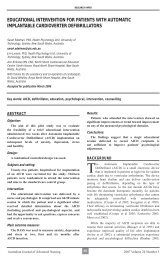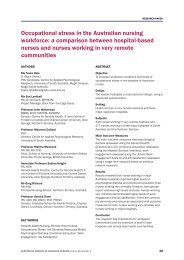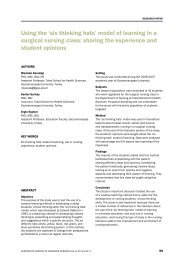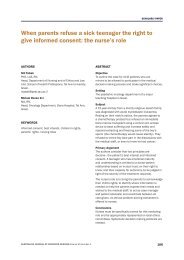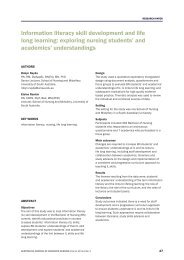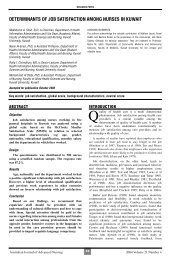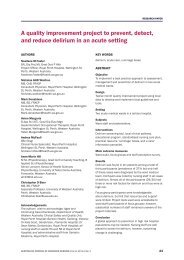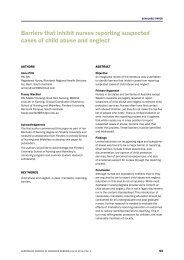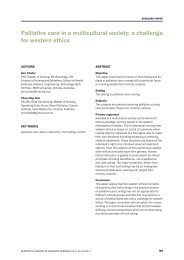australian journal of advanced nursing
australian journal of advanced nursing
australian journal of advanced nursing
You also want an ePaper? Increase the reach of your titles
YUMPU automatically turns print PDFs into web optimized ePapers that Google loves.
Spirituality propelled people into positive actions.<br />
As such, it provided many real and potential<br />
benefits and was valuable for those engaged in<br />
it. This conclusion is supported by others such<br />
as Wink (2006), Baldacchino and Draper (2001)<br />
and Fisher (2000). The findings <strong>of</strong> this study are<br />
supported by Albaugh’s (2003) phenomenologic<br />
study on spirituality and life‑threatening illness which<br />
highlighted the comfort, strength and ‘blessings’<br />
derived from spiritual involvement. In another<br />
study, Siegel and Schrimshaw (2002) reported that<br />
participants enumerated a variety <strong>of</strong> benefits, such<br />
as gaining strength, empowerment, control, social<br />
support, a sense <strong>of</strong> belonging and spiritual support<br />
through a personal relationship with God.<br />
The participants in this study demonstrated the<br />
direct links between spiritual engagement and love<br />
by enumerating how love was manifested, including<br />
mundane activities such as visiting, having c<strong>of</strong>fee,<br />
massaging, gift‑giving and embracing. In addition, a<br />
deeper relationship that involved ‘sharing intimate<br />
times’ and ‘understanding vulnerabilities’ was<br />
mentioned. Time was an opportunity to show love and<br />
spending quality undistracted time was necessary for<br />
participants. Such sentiments have been similarly<br />
reported by Fryback (1993), who stated that people<br />
with <strong>advanced</strong> illness associated health with belief in<br />
a higher power that gave them the ability to love.<br />
Engaging in spiritual issues will continue to be an<br />
important element for some people at the end <strong>of</strong> their<br />
lives. For this reason, health pr<strong>of</strong>essionals should<br />
learn to tap into this valuable resource. This study<br />
raises health pr<strong>of</strong>essionals’ awareness <strong>of</strong> clients’<br />
and caregivers’ capacity to articulate and express<br />
spirituality. This is important because spirituality can<br />
help them cope during this crucial time.<br />
Health pr<strong>of</strong>essionals, including nurses, can<br />
assist both clients and caregivers in maintaining<br />
personal relationships and religious practices, help<br />
identify spiritual meanings, look beyond present<br />
circumstances and help improve the quality <strong>of</strong><br />
life. This may involve creating environments that<br />
value relationships, even amongst strangers<br />
and addressing unique spiritual needs. Consider<br />
RESEARCH PAPER<br />
Harrington’s (2006, p. 181) exposition on the role <strong>of</strong><br />
altruistic love in which health pr<strong>of</strong>essionals spiritually<br />
connect with patients ‘sacrificially’. Displaying caring<br />
behaviours is a way <strong>of</strong> incorporating spirituality into<br />
pr<strong>of</strong>essional practice (Tanyi et al 2006).<br />
The limitations <strong>of</strong> the study relate to the nature<br />
<strong>of</strong> phenomenological descriptions and non‑return<br />
<strong>of</strong> transcripts to participants because <strong>of</strong> personal<br />
circumstances. There is no single phenomenological<br />
account that could embody the full complexity <strong>of</strong><br />
spirituality and spiritual engagement.<br />
CONCLUDING REFLECTIONS<br />
In this phenomenological inquiry, the researcher set<br />
out to understand the lived experience <strong>of</strong> spirituality<br />
and engaging in spiritual matters for clients living<br />
with life‑limiting conditions and their caregivers. In<br />
the process, the study identified the many benefits<br />
that may be derived from engaging in spirituality.<br />
The findings have relevance to clients and caregivers<br />
because they may wish to seek opportunities to<br />
discuss spiritual matters with health pr<strong>of</strong>essionals.<br />
Palliative care workers also may find the implications<br />
applicable as they may be inspired to undertake<br />
personal and pr<strong>of</strong>essional reflection and draw on<br />
this inquiry to find their own ways <strong>of</strong> assisting clients<br />
and caregivers.<br />
REFERENCES<br />
Albaugh, J.A. 2003. Spirituality and life‑threatening<br />
illness: a phenomenologic study. Oncology Nursing Forum,<br />
30(4):593‑598.<br />
Baldacchino, D. and Draper, P. 2001. Spiritual coping strategies:<br />
a review <strong>of</strong> the <strong>nursing</strong> research literature. Journal <strong>of</strong> Advanced<br />
Nursing, 34(6):833‑841.<br />
Barnhart, P. 1988. The spiritual needs <strong>of</strong> atheists and agnostics.<br />
Pr<strong>of</strong>essional Nurse, 4(3):130.<br />
Bertero, C. 2002. District nurses’ perceptions <strong>of</strong> palliative care<br />
in the home. American Journal <strong>of</strong> Hospice and Palliative Care,<br />
19(6):387‑391.<br />
Byrne, M. 2002. Spirituality in palliative care: what language do<br />
we need? International Journal <strong>of</strong> Palliative Nursing, 8(2):67‑70,<br />
72‑74.<br />
Carroll, B. 2001. A phenomenological exploration <strong>of</strong> the nature <strong>of</strong><br />
spirituality and spiritual care. Mortality, 6(1):81‑98.<br />
Cobb, M. and Robson, V. (eds) 1998. The Spiritual Challenge <strong>of</strong><br />
Health Care. Churchill Livingstone: Edinburgh.<br />
Coles, P.J. 2000. An exploration <strong>of</strong> spirituality in palliative care.<br />
Assignment, 6(2):18‑24.<br />
AUSTRALIAN JOURNAL OF ADVANCED NURSING Volume 26 Number 4 34



